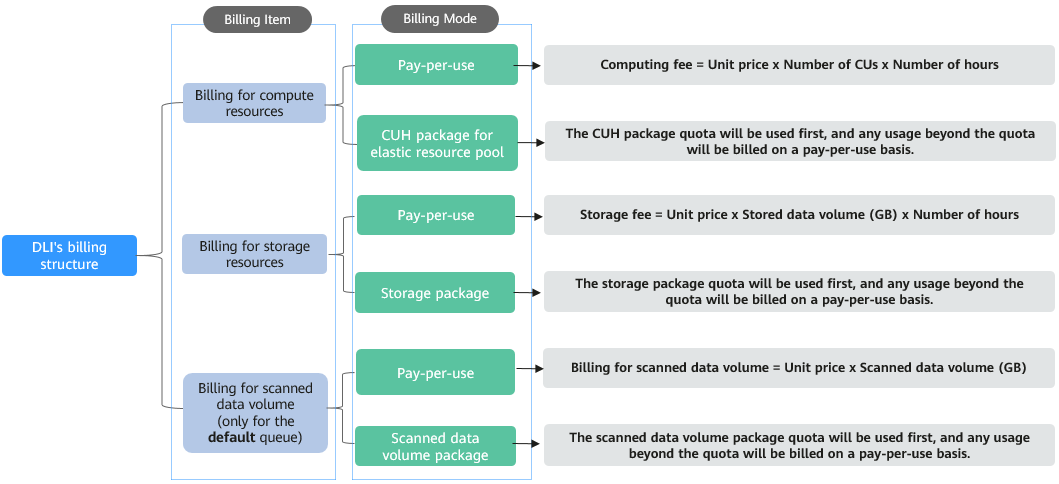Billing Overview

Billed Items
DLI billed items include billings for compute resources, storage resources, and scanned data volume. DLI offers a price calculator that allows you to swiftly determine the reference price for purchasing resources.
For more information about DLI billing, see DLI Pricing Details.
|
Billed Item |
Description |
|---|---|
|
Billing for compute resources |
You can choose to be billed for DLI compute resources using either the following methods:
|
|
Billing for storage resources |
|
|
Billing for scanned data |
|

- CU is the pricing unit for elastic resource pools. 1 CU consists of 1 vCPU and 4 GB memory. Queues with more CUs have better compute performance.
- Jobs submitted on the default queue are billed based on the scanned data volume.
Billing Modes
DLI billing modes vary depending on billed items. See Table 2.
|
Billed Item |
Billing Mode |
Description |
|---|---|---|
|
Compute resources |
Pay-per-use |
Pay-per-use queues or elastic resource pools are billed by CUH. Computing fee = Unit price x Number of CUs x Number of hours |
|
CUH |
DLI allows you to purchase elastic resource pools in the form of CUH packages. The included quota will reset based on the subscription period. |
|
|
Data stored in DLI tables |
Pay-per-use |
Storage uses are billed based on the amount of data stored in DLI, in GB. Storage fee = Unit price x Data volume (in GB) x Number of hours |
|
Storage package |
If you purchase a storage package, the quota included in the package is preferentially deducted when you use resources. If you exceed the package limit, you will be billed on a pay-per-use basis. The included quota will reset every hour. |
|
|
Scanned data volume |
Pay-per-use |
Fees for scanned data volume = Unit price x Scanned data volume (in GB) |
|
Scanned data volume |
If you purchase a scanned data volume package, the quota included in the package is preferentially deducted when you use resources. If you exceed the package limit, you will be billed on a pay-per-use basis. The quota included in the scanned data volume package will reset based on the subscription period. |

- Reset by subscription period: For example, if the reset period is monthly and you purchase a package on January 5, the included free resources will reset on the fifth day of each month.
- Reset by calendar period: For example, if you purchase a package and the reset period is monthly, the included free resources will reset at 00:00:00 on the first day of each calendar month.
- Storage packages reset every hour based on the calendar period, while other packages reset based on the subscription period.
Application Scenarios
- Development project: This project is mainly used by engineers for development and debugging. The workload is random and the data volume is small. To address this situation, you are advised to use the CUH billing mode, which can help you effectively control costs and keep resource consumption within a certain range. If you have a short-term need for exclusive resources, you can also select the dedicated resource mode when purchasing a pay-per-use queue.
- Production project: Your workload is relatively stable (developed and debugged before going online). You are advised to use the package billing mode, which is more cost-effective. In addition, for pay-per-use queues, after being idle for 1 hour (meaning there are no running jobs on the queue), the system will automatically release compute resources. When using the queue again, compute resources need to be reallocated, which may take 5–10 minutes. Using the package billing mode can save waiting time.
Feedback
Was this page helpful?
Provide feedbackThank you very much for your feedback. We will continue working to improve the documentation.See the reply and handling status in My Cloud VOC.
For any further questions, feel free to contact us through the chatbot.
Chatbot





